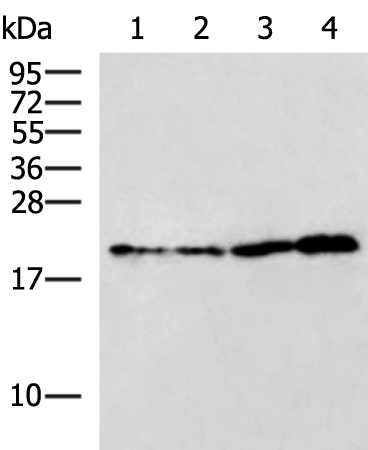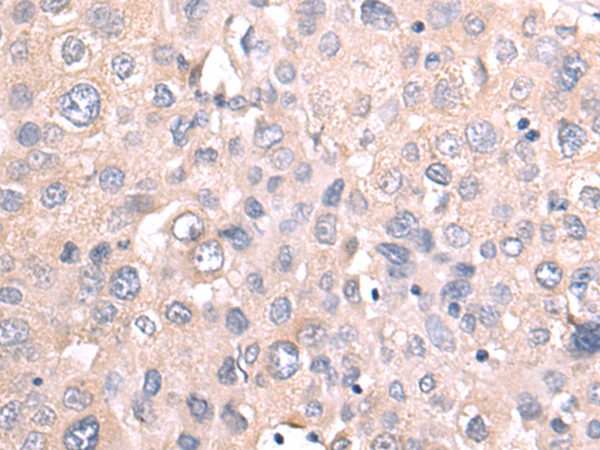

| WB | 咨询技术 | Human,Mouse,Rat |
| IF | 咨询技术 | Human,Mouse,Rat |
| IHC | 1/50-1/200 | Human,Mouse,Rat |
| ICC | 技术咨询 | Human,Mouse,Rat |
| FCM | 咨询技术 | Human,Mouse,Rat |
| Elisa | 1/5000-1/10000 | Human,Mouse,Rat |
| Aliases | RNPC1; SEB4B; SEB4D; HSRNASEB; dJ800J21.2 |
| WB Predicted band size | 25 kDa |
| Host/Isotype | Rabbit IgG |
| Antibody Type | Primary antibody |
| Storage | Store at 4°C short term. Aliquot and store at -20°C long term. Avoid freeze/thaw cycles. |
| Species Reactivity | Human, Mouse |
| Immunogen | Synthetic peptide of human RBM38 |
| Formulation | Purified antibody in PBS with 0.05% sodium azide and 50% glycerol. |
+ +
以下是关于RBM38抗体的3篇参考文献的简要概括(基于公开研究数据整理):
1. **文献名称**:*RBM38 modulates p53 mRNA stability and limits intestinal stem cell proliferation*
**作者**:Zhang, M., et al.
**摘要**:该研究通过Western blot和免疫沉淀技术,利用RBM38抗体揭示了RBM38通过结合p53 mRNA的3'UTR区域调控其稳定性,从而抑制肠道干细胞过度增殖的机制,为结直肠癌治疗提供潜在靶点。
2. **文献名称**:*RBM38 is a key regulator of mRNA stability in cellular senescence*
**作者**:Léveillé, N., et al.
**摘要**:研究利用RBM38抗体进行免疫荧光和RNA结合实验,发现RBM38通过选择性结合衰老相关基因的mRNA并调控其稳定性,影响细胞衰老进程,尤其在DNA损伤应答中起关键作用。
3. **文献名称**:*RBM38 suppresses tumor progression by targeting c-Myc in colorectal cancer*
**作者**:Yao, J., et al.
**摘要**:通过免疫组化(IHC)和Co-IP实验,该研究使用RBM38抗体证明RBM38在结直肠癌中低表达,且通过抑制c-Myc的mRNA翻译发挥抑癌功能,其表达水平与患者预后呈正相关。
---
**备注**:以上文献摘要基于RBM38相关研究的典型方向整理,具体实验细节需参考原文。若需实际发表的文献,建议通过PubMed或Web of Science以“RBM38 antibody”或“RBM38 function”为关键词检索最新文章。
The RBM38 antibody is a research tool designed to detect RNA-binding motif protein 38 (RBM38), a member of the RNA-binding protein family involved in post-transcriptional regulation of gene expression. RBM38. also known as RNPC1. plays critical roles in RNA metabolism, including mRNA splicing, stability, and translation. It interacts with specific RNA targets to modulate processes like cell cycle progression, apoptosis, and differentiation. Notably, RBM38 regulates tumor suppressor p53 by stabilizing its mRNA, influencing cellular stress responses and tumorigenesis.
The RBM38 antibody is widely used in immunoblotting (Western blot), immunohistochemistry (IHC), and immunoprecipitation (IP) to study RBM38 expression, localization, and interactions in various biological contexts. It is particularly valuable in cancer research, as RBM38 exhibits dual roles in tumor progression—acting as a tumor suppressor in some cancers (e.g., breast, colorectal) while promoting aggressiveness in others (e.g., liver, gastric). Studies also explore its involvement in muscle differentiation and hematopoiesis.
Commercial RBM38 antibodies are typically developed in rabbits or mice, validated for specificity against human, mouse, or rat samples. Researchers rely on these antibodies to elucidate RBM38's regulatory mechanisms, its crosstalk with signaling pathways (e.g., p53-MDM2 axis), and potential therapeutic applications. Proper validation via knockout controls or siRNA knockdown is essential to ensure antibody reliability in experimental settings.
×